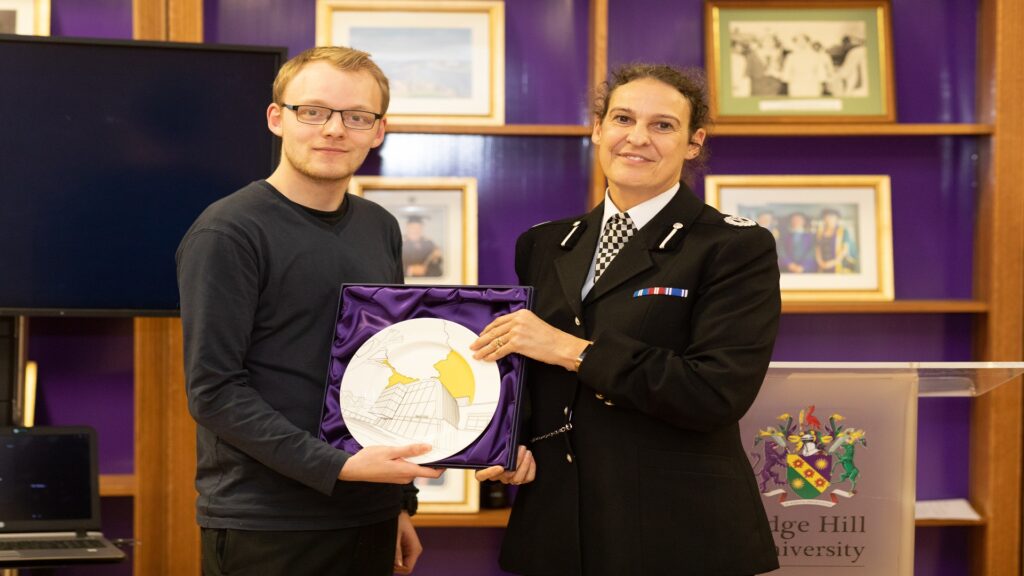Criminal Intelligence & Data Analysis MSc
Develop your knowledge of criminal intelligence and data analysis. Support complex crime investigations and improve organisational decision making by mastering techniques in data analysis and the development of intelligence.
Overview
| Course length: | 1 year full-time 2 years part-time |
|---|---|
| Start dates: | September 2025 September 2026 |
| Location: | Edge Hill University |
| Example offers: | 2:2 in a related discipline View full entry criteria |
| Subject(s): | Policing and Criminal Justice |
| Faculty: | Arts and Sciences |
| Department: | Law and Criminal Justice |

Our MSc Criminal Intelligence & Data Analysis Masters degree will expand your knowledge of the impact of emerging technologies, as well as the development and use of intelligence and digital media to support criminal investigations and improve organisational insight. You will have the opportunity to study topics such as cyber-crime, intelligence analysis, data science, practical data analysis and digital policing.
This is a growing area of business in a range of sectors, from law enforcement to private business. Studying with us, you will master techniques in data analysis and the development of intelligence that can improve organisational decision making and support complex crime investigations. The use of ‘big data’ and new technologies is big business. It is also an area that offers many opportunities in law enforcement investigation and intelligence development.
Develop your expertise in information and intelligence analysis, and the use of intelligence in criminal investigations. Enhance your ability to negotiate and debate effectively on issues in policing and law enforcement, specifically in relation to the development and use of criminal intelligence and data analysis. Strengthen your understanding in applying data to support tactical and strategic decision-making.
You will also benefit from having access to our dedicated Police Training and Simulation Facility (the ‘Crime House’) to participate in practical workshops and have access to the Moot Court Room.
Course features
-
International students can apply
What you'll study
Throughout your Masters in criminal intelligence and data analysis, you’ll examine the process and development of intelligence and data in a law enforcement setting. You will develop your knowledge and understanding of advanced research skills, including the formulation of a research proposal that will form the basis of your dissertation.
How you'll study
This criminal intelligence and data analysis course will be delivered through traditional face-to-face learning. You will typically attend weekly lectures and interactive seminars.
Classes will involve a series of tutor-led elaborations and evaluations, as well as student-led engagements, including the presentation of problem-solving exercises and discussion of pre-set questions.
Additional face-to-face or online student support sessions, along with access to online learning and research materials, will also be available.
How you'll be assessed
You will be assessed through a variety of coursework tasks which will include assignments, such as essays, individual or group presentations and the completion of portfolios. During the seminar sessions there will be problem-solving exercises involving case studies or hypothetical scenarios. You will be required to identify and apply the pertinent legislation, policy, process, or regulations to a given set of facts.
Your dissertation will be 12,000 words in length and could, for example, focus on a topic involving research around an element of intelligence, data analysis, or workplace experience (suitably anonymised). It may also be conducted in the context of an employment setting, such as a police force or law enforcement agency.
There are no formal written examinations as part of the current assessment methods on this taught Masters degree.
Who will be teaching you
Designed and delivered by a former intelligence analyst, ex-senior professional police officers, and academics in policing and law enforcement, the course is taught by staff who have significant experience of senior roles within the police service, including chief constable, head of crime, head of professional standards and senior analyst levels.
Your learning will be underpinned by extensive professional experience and cutting-edge research into investigations and associated processes, including the management of intelligence.
Guest speakers and subject matter experts from other departments and external to the University will also contribute to delivery of the course.
Where your course includes optional modules, these are to provide an element of choice within the course curriculum. The availability of optional modules may vary from year to year and will be subject to minimum student numbers being achieved. This means that the availability of specific optional modules cannot be guaranteed. Optional module selection may also be affected by timetabling requirements. Some restrictions on optional module choice or combinations of optional modules may apply.
Your future career
Our MSc Criminal Intelligence & Data Analysis enhances your knowledge and employability for intelligence and analytical roles. The course provides a range of opportunities to develop and enhance knowledge and skills that can be applied in a range of settings, from research through to a variety of law enforcement and appropriate industry fields.
Entry criteria
Entry requirements (2025 / 2026)
Graduates from an undergraduate degree in a related discipline (2:2 minimum) including policing, criminology, criminal justice, crime scene investigation, computer and cyber investigation. Graduates from a range of other disciplines will be considered.
Relevant professional qualifications and / or appropriate work experience will also be considered in line with the University’s RPL process. This will allow for recruitment of current police officers, police staff (e.g., analysts, researchers, and intelligence officers) and staff from other law enforcement agencies with significant related work experience.
Consideration will also be given to international students with equivalent academic qualifications or professional qualifications and / or experience.
An interview may form part of the selection process for any applicant not in possession of a 2.2 undergraduate degree in a related discipline prior to the offer of a place.
English language requirements
International students require IELTS 6.5, with a score no lower than 6.0 in each individual component, or an equivalent English language qualification.
If your current level of English is half a band, one band, or one-and-a-half bands lower, either overall or in one or two elements, you may want to consider our Pre-Sessional English course.
How to apply
There is an online application process for this course.
Please choose the application form for your preferred mode of study.
Apply for September 2025 Full-Time
Apply for September 2025 Part-Time
Should you accept an offer of a place to study with us and formally enrol as a student, you will be subject to the provisions of the regulations, rules, codes, conditions and policies which apply to our students. These are available at www.edgehill.ac.uk/studentterms.
There’s plenty of opportunities to come take a look around campus. Attend one of our open days to see what life at Edge Hill University is all about.
Book an open day
Facilities
The £6million Law and Psychology building provides contemporary teaching and learning facilities for students in the School of Law and Criminal Justice and the Department of Psychology. 
The three-storey building includes a 250-seat lecture theatre, seminar and tutorial rooms, and social learning areas which encourage a more informal and interactive style of learning.
Where you'll study
Finance
Tuition fees
UK Full-Time
£9,250
for the course
UK Part-Time
£51 per credit
for the course
International
£17,000
for the course
EU/EEA and Swiss students who have settled or pre-settled status under the EU Settlement Scheme, as well as Irish nationals, may be eligible for the UK tuition fee rate.
Financial support
Please view the relevant Money Matters guide for comprehensive information about the financial support available to eligible UK students joining postgraduate courses at Edge Hill University.
EU/EEA and Swiss students who have settled or pre-settled status under the EU Settlement Scheme may be eligible to apply for financial support. Irish nationals can ordinarily apply to Student Universal Support Ireland (SUSI). If you are an EU student who does not have settled or pre-settled status, or are an international student from a non-EU country, please see our international student finance pages.










